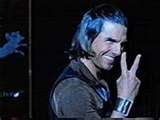At the age of 65, Warren Schmidt finds himself with nothing to do but write hilariously overly detailed letters to his African foster kid, Ndugu. When his overbearing wife of 42 years dies suddenly, Schmidt decides to take a cross-country trip on the way to his daughter’s wedding. Warren doesn’t really have a good idea of what he’s looking for on his journey and the trip itself is less than exciting (like Schmidt himself). But watching Nicholson inhabit this drab little man is a wonder. When he does eventually arrive in Denver and meets his future in-laws, the film becomes relentlessly hilarious. Kathy Bates is brilliant as the boozy “free-spirited” mom of Dermot Mulroney (giving a great little performance himself), Schmidt’s dimwitted future son-in-law. And Howard Hesseman – due for a comeback – is very funny as an overly laid back aging hippy. But it’s always Nicholson’s reactions to these characters that really brings out the comedy here… and the pathos as well.
About Schmidt is not a perfect film. The pacing is slower than it should have been and the first two acts drag on a bit too long. Frankly, without Nicholson’s high-wattage brilliance, none of this would have been nearly as effective as it is. But with all the pieces where they are, About Schmidt succeeds more often than it fails and, in the end, presents one man’s quest for meaning as both funny and surprisingly moving.
About Schmidt is not a perfect film. The pacing is slower than it should have been and the first two acts drag on a bit too long. Frankly, without Nicholson’s high-wattage brilliance, none of this would have been nearly as effective as it is. But with all the pieces where they are, About Schmidt succeeds more often than it fails and, in the end, presents one man’s quest for meaning as both funny and surprisingly moving.





